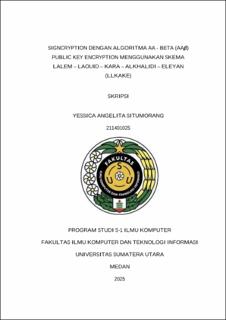| dc.description.abstract | In the digital era, message exchange security faces significant challenges due to risks
of hacking, eavesdropping, and modification by unauthorized parties. To address this
issue, cryptography plays an important role in maintaining message confidentiality,
authentication, and integrity. This research proposes the implementation of
signcryption technique using AA-Beta (AAβ) Public Key Encryption algorithm
combined with Digital Signature scheme – Lalem – Louid – Kara - Alkhalidi - Eleyan
(LLKAKE) to enhance digital communication security. By applying the encrypt-then-
sign method, this system ensures messages remain confidential, authenticated, and
intact. The system is developed using Python and designed for .docx text files. Testing
conducted on text sizes ranging from 10 to 2000 characters demonstrates high
efficiency with average times of 0.018098 seconds for encrypt-then-sign and
0.047312 seconds for verify-then-decrypt. To test system resilience, two types of
brute-force attacks were performed: conventional factorization algorithm and
Kraitchik algorithm. With the conventional factorization algorithm, the required time
increases drastically from 0.000054 seconds for 10-bit numbers to 53.210127
seconds for 30-bit numbers. 35-bit numbers could not be solved within 3600 seconds.
The Kraitchik algorithm shows similar results with times of 0.000511 seconds for 10-
bit, 0.010830 seconds for 15-bit, 0.270859 seconds for 20-bit, and 5.366103 seconds
for 25-bit numbers. 30-bit and 35-bit numbers also remained unsolved within the
3600-second time limit. Test results show that the longer the bit length of numbers,
the more difficult and time-consuming it becomes to break them. Although the
Kraitchik algorithm is theoretically faster than the conventional algorithm, it still
requires very long processing times for large numbers. This proves that the
developed system is secure against various types of factorization attacks and can be
relied upon to secure digital communications | en_US |


